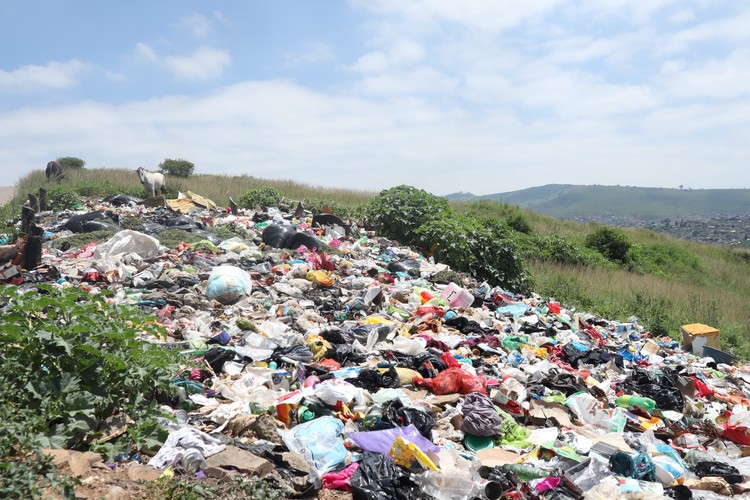
9 February 2024
Illegal dumpsites, like this one in Imbali, are mushrooming in Msunduzi. Photos: Joseph Bracken
Tens of thousands of households in Msunduzi do not have their refuse collected by the municipality. The waste management department of Msunduzi is not able to do curbside refuse collection for 12 of the 41 wards in the municipality, according to Wilson Mhlongo, senior manager for waste management.
These wards are: 2, 3, 4, 5, 6, 7, 8, 9, 13, 14, 16 and 39.
There are nearly 214,000 households in Msunduzi, according to Stats SA’s 2022 census. Mhlongo explained that there are now 116,000 households in Msunduzi receiving regular weekly refuse collection. This would leave close to 98,000 households without basic refuse collection.
The municipality does not have the resources to deal with refuse in the whole city, said Mhlongo.
This has contributed to growing illegal dumping sites and the burning of waste by residents. Some expressed their frustration to GroundUp about having no other option.
Derrick Gumede has lived in Imbali Phase Four, an RDP housing project in ward 17, for over 20 years. Refuse is collected in other parts of the ward, but Gumede says he has never seen a refuse truck.
Although the councillor comes fairly frequently to the area, it’s never to deal with the refuse issue, says Gumede. Residents have lived with the problem for so long that many don’t think it’s worth complaining about anymore. “We’re used to it now”, he says.
Another Phase Four resident, Nkululeko Lekhoaba, has had to fence off an illegal dump site which spills onto the property where he lives with his brother and two children. “The smell is awful,” he says.
They have had to take the issue into their own hands to try and get other people to stop dumping refuse on their property, “It’s dangerous, we’ve tried to get people to stop so many times”, said Lekhaoba. The dump site has also attracted snakes and rats to the property, he added.
Nkululeko Lekhoaba, a resident of Phase Four in Imbali, in front of an illegal dumping site which is spilling onto his property.
Thandeka Mthalane lives across the ridge from Phase Four in an area called BB4. Mthalane burns all of her refuse since the trucks don’t come to her area. She says she sees the truck drive past her every week to other suburbs.
Mhlongo says the department is looking at ways to extend the service to these areas. Households will then be charged for refuse collection based on their income.
In two wards where the rubbish is not collected from households - ward 2 and ward 13 - bulk refuse collection containers have been installed, which the municipality empties. The other ten wards have no form of municipal refuse collection.
The waste management department has a list of over 350 illegal dumping “hotspots” across the city which they monitor closely. These “hotspots” are in almost every ward in Msunduzi. The only wards with no hotspots are areas where a list is yet to be sent in by the ward councillor.
Ward councillors notify the municipality when the dumpsites accumulate and trucks are sent to clear the area, Mhlongo says.
Since his tenure began, he says, the department has expanded refuse collection to areas that had no refuse collection, including Ward 1.
The Msunduzi waste management department has also enlisted the help of the Department of Forestry, Fisheries and the Environment, which has provided Expanded Public Works Programme (EPWP) workers to help with the “cleaning and greening programme”, which aims to clean illegal dumping sites and then plant vegetation over them. “It’s not going as as it should, but it is a way forward,” says Thakasani Manzi, pollution control officer at Msunduzi Municipality.
Faced with the lack of refuse collection, some residents have taken action. Five months ago Edendale resident Mlu Ntuli started a refuse collection and recycling service, Liberty, a non-profit organisation.
Liberty, which is funded by the Youth Employment Service (YES) programme, services the greater Edendale area, including Imbali. At the moment only businesses and schools are serviced, but Ntuli plans to expand to households. An area has been cleared to serve as a site where all residents can take their recycling and the site should be up and running soon, he says.
The recycling centre will be funded by the EPR Waste Association of South Africa (eWASA).
The waste collected is taken to a depot and Liberty is paid 70c per kilo of cardboard and between 40c and R1.50 for plastic bottles.
Mlu Ntuli, founder of Liberty, in the fenced-off area where residents will soon be able to bring their refuse to be recycled.